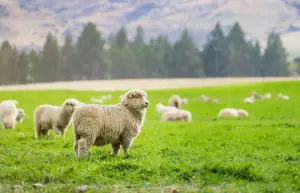How Smart Are Sheep?
For a person to be referred to as a “sheep” is not a compliment. This statement is meant to imply that the person is a follower, unable to think for himself – like the sheep moving with the flock. But does the sheep’s natural tendency to follow the herd mean that they are not intelligent?
How smart are sheep? The truth is, the sheep’s reputation for being unintelligent is unfounded – they are actually quite smart animals. Sheep have tested high in recognition, cognition, and have been known to feel and show complex emotions.
Sheep have been surprising sheep owners and scientists with their problem-solving abilities and antics for many years, from learning through color to recognizing and preferring particular companions. Read on to learn more about why sheep have earned their reputation, what studies about sheep intelligence have shown, and the emotions of sheep.
Understanding Sheep Intelligence 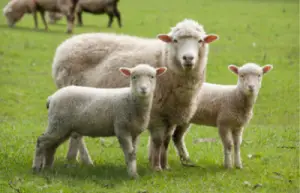
The very reason that sheep have earned a reputation of being mindless followers is also one of their greatest defenses against predators. Sheep prefer to stick close to other sheep – where one goes, the rest will follow, so that the flock remains together. This instinct is a protective measure and helps to increase their chances of survival.
It is because of this instinct that a sheep will become distressed when removed from the flock, highly alert, and often pacing. It has been said that sheep need a flock of at least 4-5 other sheep, and each individual will keep the rest of the sheep in their field of vision while grazing. They protect one another, they soothe one another, they need one another.
As it turns out, Benjamin Franklin’s quote “Make yourself sheep and the wolves will eat you” is not quite the fair comparison it is thought to be!
Will sheep really follow one another right off of a cliff? They might. But a sheep does not make a conscious choice to follow another into danger. The drive to follow the flock is instinctual, and while it may theoretically cause danger to the individual such as in the cliff scenario, it is much more likely to protect them from the very real (and more likely) danger of predators.
Studies Showing How Smart Sheep Are
So what do scientists who study sheep have to say about their level of intelligence? As it turns out, quite a lot!
Sheep Cognition Study 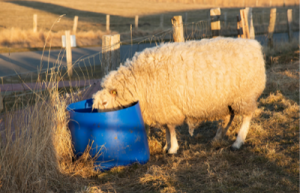
Sheep are able to distinguish colors within the blue-green-yellow color spectrum, and scientists have used this ability to administer cognitive tests to them. In one study, researchers presented different colored feed buckets to sheep, always putting the feed in one particular colored bucket and leaving the other colored buckets empty. The sheep quickly learned to ignore the buckets that were empty, focusing solely on the bucket of a particular color they knew held the feed.
This ability was not limited to colors. The researchers then changed the experiment slightly – using shapes to identify the buckets instead of color. While recognizing colors came more easily to the sheep, they were also able to recognize the shape on the bucket that held the feed, relying on that to locate their feed.
Furthermore, it was determined that sheep, from a very young age, understood that even when the lid was closed, there was feed in the bucket. This is a concept called object permanence, the idea that an object still exists even if it can no longer be seen or heard, and is not present in humans until around the age of six months!
Sheep Recognition Study
Sheep have an excellent memory. In one scientific trial, sheep who had found food hidden in a maze remembered where the food was hidden when re-tested 22 weeks later.
In 2001 another study was performed by scientist Keith Kendrick in which he showed photographs of 25 separate pairs of sheep and used food rewards to determine if the sheep could distinguish between the individuals in each pair. This led to the discovery that sheep can recognize and distinguish between at least 50 individual sheep faces through photographs. What’s more, is this memory stuck with the sheep for two years!
Have you ever wondered if your sheep recognizes you?
They do! Sheep recognize human faces, including photos of human faces. One study showed sheep memorized and recognized pictures of various celebrities. Not only can sheep recognize human faces, but they also recognize human facial expressions. Sheep can distinguish between happy, sad, and angry human facial expressions – showing preference to photos with smiles as opposed to frowns.
Sheep, like other animals, are also able to learn and recognize the name that is given to them. This does not, however, mean that they will come to you when called!
Sheep Relationship Study
Did you know sheep, like humans, can have best friends? Because of the sheep’s ability to distinguish and recognize many faces and other differences among fellow sheep, they are able to form bonds with specific individuals. They will show preference and remain physically close in these relationships.
Ewes are particularly sensitive to the faces of lambs and other ewe companions. Lambs, after 1-2 months, will also show signs that they recognize the faces of their mothers.
When shown photos of both sheep and other species, sheep tend to show preference to the photos of sheep. Taken a step further, when shown photos of various breeds of sheep, a sheep will tend to prefer the photo of a sheep that is of the same breed. Photos of familiar sheep will soothe a lone sheep, while photos of a goat will not have the same effect.
In 1993, researchers from the University of California observed a flock of rams for three years. They found that the rams, like ewes, establish close friendships with other individual rams and will stick up for one another – even intervening on behalf of weaker rams and supporting one another in conflict.
How Does Sheep Intelligence Compare to Other Animals? 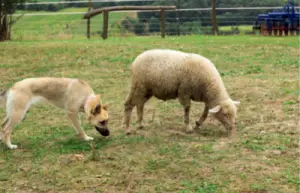
Are sheep smarter than goats? Pigs? What about the renowned border collie?
Intelligence among different species is not an easy comparison. Pigs are known to be highly intelligent animals – even recognizing themselves in a mirror, which is not something most animals are capable of. In these same mirror tests, pigs have shown they can even accurately locate food by looking at the reflection of food in a mirror. So are sheep smarter than pigs then? Most would say the answer is no.
Sheep do not recognize themselves in mirrors – but neither do dogs. In terms of self-awareness, this would put them on an even playing field. However, dogs are famous for the number of commands they can learn, their problem-solving skills, and some dog breeds in particular are known for their ability to think independently and make decisions on the fly when working in a pasture by themselves.
How about among goats, a close relative of the sheep? While goats are more independent than sheep, we can see that independence (and in the opposite camp, staying with a flock) are not adequate measures of intelligence. Goats and sheep are found to have a similar level of intelligence – with a lot of variables including breed, environment, and individual personality.
Factors That Can Determine How Smart a Sheep Is
Emotional Experiences 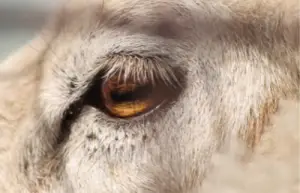
Sheep experience a range of emotions. A sheep who has had a lot of negative experiences – for example, poor treatment or sustained levels of stress – will perform more poorly on tests of cognition than their more content counterparts. This is true of humans as well when looking at research into trauma and cognitive function.
Disappointment
Sheep have also shown the ability to form expectations. Sheep who have been consistently given a particular food reward, and are then given a smaller or lesser reward, will show signs of disappointment. This is called “appraisal theory”, and shows that sheep can both form expectations and also make comparisons.
Environment
Play can be used as a predictor of mood. Young rams tend to play by mounting and headbutting one another, bucking and spinning around. Young ewes can be seen frolicking and dancing about together. This shows that the animal is content and happy – without stress or anxiety. Sheep that are raised in a healthy environment that is conducive for their overall well-being are more likely to function at a higher level.
Attachment
Of course, like most animals, ewes are also fiercely bonded to their lambs. When a lamb is removed from its mother too early, the ewe will become obviously distressed – pacing, making high-pitched vocalizations, and even urinating. The lamb too will be traumatized. Lambs taken from their mother too early have been found to suffer psychological repercussions – including experiencing anxiety as adults and being stunted socially.
Sheep will show you how they are feeling if you pay attention. For example, a content sheep will show you ears that are hanging loosely, relaxed to the side, and may even have heavy-lidded eyes. A sheep who is in distress will have ears that are pointing back and may show you slightly bulging eyes and flared nostrils.
As you can see, there is little truth to the idea that sheep are lacking in the intelligence department. In fact, if someone should ever call you a “sheep” in the future, you can thank them for referring to you as a smart, perceptive, and emotional being.
Save this to your “Sheep” board on Pinterest!

